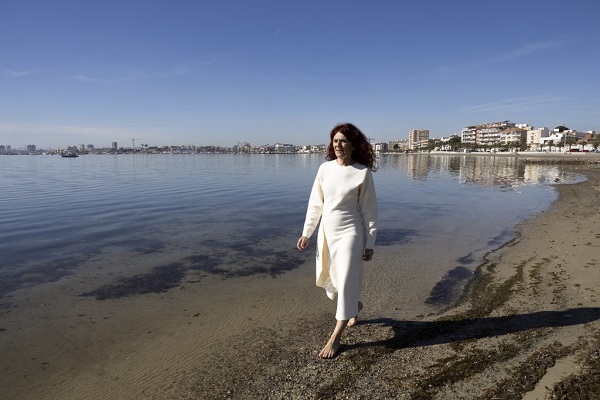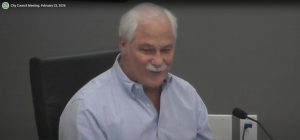Teresa Vicente honored as Mar Menor is first ecosystem in Europe granted legal rights
7 min read
DJ Suss D: Rights of nature campaigns are slowly gaining ground. Considered to be the most important saltwater coastal lagoon in the western Mediterranean, the once-pristine waters of the Mar Menor have become polluted due to mining, rampant development of urban and tourist infrastructure, and in recent years, intensive agriculture and livestock farming.
[00:00:21] Professor of Philosophy of Law at the University of Murcia, director of the Chair of Human Rights and Rights of Nature, Global Alliance for the Rights of Nature collaborator, and 2024 Goldman prize winner, Teresa Vicente grew up in the region and is deeply attached to the Mar Menor.
[00:00:38] Vicente, after a mass fish die-off in 2019, became convinced that the only way to give the lagoon a chance of survival was to grant it legal personhood and recognize its rights.
[00:00:50] The rights of nature theory has not gained much traction in Europe until recently when ecosystems in Latin America and New Zealand granted such legal rights. Granting rights of nature is a concept that has long been debated but has only gained momentum in the last decade. Ecosystems such as the Atrato River in Colombia and New Zealand’s Whanganui River have been granted legal personhood.
[00:01:14] According to the Ecuadorian Constitution of 2008, Nature, or Pachamama, where life is reproduced and occurs, has the right to integral respect for its existence and for the maintenance and regeneration of its lifecycles, structure, functions, and evolutionary processes.
[00:01:33] In cases of severe or permanent environmental impact, including those caused by the exploitation of nonrenewable natural resources, the state shall establish the most effective mechanisms to achieve the restoration and shall adopt adequate measures to eliminate or mitigate harmful environmental consequences and take preventative measures.
[00:01:53] All persons, communities, peoples, and nations can call upon public authorities to enforce the rights of nature.
[00:02:01] In New Zealand, the Whanganui River under a 2017 law Te Awa Tupua was recognized as an indivisible and living whole, comprising the Whanganui River from the mountains to the sea including all its physical and metaphysical elements.
[00:02:17] Two guardians were appointed by the local Maori to speak on the river’s behalf. Other countries have followed Whanganui’s lead. Two rivers in India have been declared legal entities and recently Bangladesh gave all its rivers legal rights.
[00:02:34] In May 2020 Professor Vicente launched her campaign with a newspaper article proposing the use of a Spanish ‘Popular Legislative Initiative’ or ILP, a provision that lets citizens propose a law directly to Parliament.
[00:02:48] At a public meeting in July 2020, Teresa elaborated on the idea of legal rights for nature. Soon she wrote the first draft of a bill and together with seven colleagues went to Parliament to submit the ILP to grant legal rights to the Mar Menor.
[00:03:03] The policy regulating the ILP process carried a strict requirement: She had to collect 500,000 signatures. She started to raise awareness of the campaign, writing an article for a local paper and despite initial opposition she managed to win support from the riverbank communities who were enraged by the pollution on their doorstep.
[00:03:21] By 2021 Vicente had collected more than 600,000 signatures, more than she needed to propose the bill. Public demonstrations, meetings with government representatives, and media interviews followed and in September (20)22, Spain’s Senate passed it into law.
[00:03:38] Lawyer Eduardo Salazar Ortuño spoke to Rights of Nature Sweden on the process of granting legal rights to Mar Menor in Spain and the importance of the rights of nature.
[00:03:45] Eduardo Salazar Ortuño: Mar Menor was a catastrophe, an ecological catastrophe, an ecocide we have been seeing for five, six years, so we have been seeing the Mar Menor dying. Rights of nature is the new approach for people, for judges, for lawyers, for authorities, for civil servants to understand that we are part of Mar Menor and Mar Menor is part of us. We need to change the paradigm of an ecosystem as object and have the ecosystem as subject, so with the subject with legal personhood.
[00:04:30] The Mar Menor will have rights, have rights today, because the law was passed last 30 of September. So it means that the Mar Manor has rights, there will be representatives, they will hear the voice of the Mar Menor, there will be a scientific committee, they will translate to us what the ecosystem needs.
[00:04:58] And it will be also an act of populares. That means that every person can go to court or to the administration without demonstration of a property right, health right, or other linkage or related right. So it means the right of nature in Mar Menor, the first in Europe, can change things in the whole of Europe. We have made, with the first ecosystem in the world, which is the People’s Legislative Initiative, this is a possibility which is in our constitution, in the Spanish constitution, and we needed 500,000 signatures from Spanish citizens. We got almost 700,000 signatures in nine months and during the pandemic. So it was incredible…
[00:05:54] Justice needs to be ecological justice. Justice is over the economy and the law. Justice is related with ethics and the ethics and awareness of people in Mar Menor have changed. And my awareness of my ethics have changed also, because I have seen the people collecting signatures in pandemic and this is very powerful.
[00:06:20] So (the) same people going everyday, every party, every concert, every moment with many people collecting, collecting, collecting. Women were protagonists of this movement and for me, I feel lucky to be part of the process.
[00:06:39] DJ Suss D: Rights of nature campaigns are still in their infancy and change is only incremental but it seems to be gaining more and more support as word gets out. For KEPW News, I’m DJ Suss D.
[00:06:51] John Q: And this is John Quetzalcoatl Murray. Recognized this year with the Goldman Environmental Prize, Teresa Vicente:
[00:06:58] Teresa Vicente: Quiero expresar mi emoción por ser la ganadora del premio Goldman 2024 para Europa, y dirigir mi agradecimiento a la familia Goldman, al personal de la fundación y al jurado que me eligió, también a todas aquellas personas que en el mundo luchan por los derechos de la naturaleza, y en especial a la ciudadanía española por haber obtenido el gran logro de reconocer al Mar Menor como el primer ecosistema en Europa titular de derechos propios.
[00:07:42] John Q: She thanked the Goldman family, the foundation, and the jury on behalf of everyone fighting for the rights of nature. She especially thanked the people of Spain, who made the Mar Menor the first European ecosystem granted the rights of personhood.
[00:07:55] Teresa Vicente: Reconocer que la naturaleza tiene derechos significa repensar nuestra comprensión del mundo basada en el dominio del ser humano sobre la naturaleza, y adaptar nuestro modelo de desarrollo a las exigencias y las necesidades de los ecosistemas como entidades vivas y en peligro.
[00:08:23] John Q: To recognize the rights of nature means we have to rethink our model of a world based on human domination over nature, and adapt to the needs of living and endangered ecosystems.
[00:08:34] Teresa Vicente: Significa enfrentar la crisis ecológica desde la nueva comprensión que aporta la ciencia de la ecología y que converge con la sabiduría ancestral de los pueblos indígenas.
[00:08:52] John Q: It means we must confront the ecological crisis with a new understanding provided by our science of ecology, where it meets Indigenous wisdom.
[00:09:02] Teresa Vicente: Reconocer que las entidades naturales, como el caso del Mar Menor y su cuenca en España son sujetos de derechos significa afirmar que la tierra tiene dignidad, que los seres humanos formamos parte de la biosfera, y que somos responsables de la habitabilidad de nuestro planeta.
[00:09:30] John Q: To recognize the rights of the Mar Menor watershed means we are responsible for the livability of our planet.
[00:09:36] Teresa Vicente: El futuro no está determinado, es incierto y variable, y por tanto, está abierto a un nuevo modelo de desarrollo capaz de transformar el sistema actual. La premisa para una transformación ecológica es que tenemos que pensar y actuar de forma diferente, porque hemos adquirido un nuevo poder sobre la naturaleza que nos exige nuevas responsabilidades.
[00:10:14] John Q: Teresa said the future is uncertain and therefore open to a new way. We have to think and act differently. This is our time and we have to do it now. As we eat fresh foods from the living earth, she urges us to remember, we are all part of a vast ecosystem.
[00:10:29] Teresa Vicente: Este es nuestro momento y tenemos que hacerlo ahora. Llenos de información y conocimiento y con la llamada la acción de convertir la utopía en una nueva experiencia, yo les apremio a comer frutas y verduras de temporada y de un suelo vivo, a pensar en la naturaleza como miembros de la comunidad de la tierra y a recordar que todos formamos parte de un ecosistema más amplio. Muchas gracias.
Audio of Eduardo Salazar Ortuño courtesy Rights of Nature Sweden. Audio and image of Teresa Vicente at Mar Menor copyright 2024 Goldman Environmental Prize and published with express written permission.




